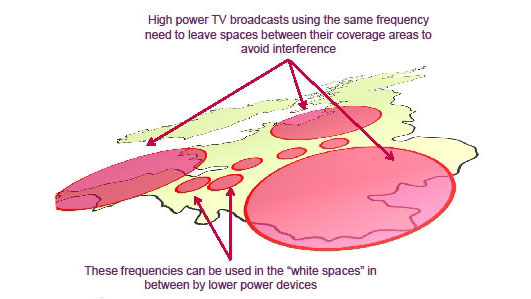Google and Microsoft showing 'extreme' interest in UK airwaves
Hey, we give you broadband, yes?

The technology heavyweights could be looking to nab spectrum to start offering new services.
Google and Motorola have expressed 'extreme interest' in acquiring currently unused UK airwaves, possibly in a bid to offer broadband in the UK or begin to connect remote devices together, according to The Telegraph.
The unused spectrum – known as 'White Space' by Ofcom, which is looking to license out the frequencies – is currently used to make sure high power TV signals don't interfere with one another.
No worries – we'll have it
However, this means that lower-power devices operating in a short range would be able to make use of the space, enabling Wi-Fi routers with wider ranges or allowing things like appliances or utility meters to be better-connected within the home and through thicker walls.
The Telegraph's senior government sources have claimed that the two companies see this technology as a chance to offer something very different to Apple, with the possibility being that Wi-Fi would be available as part of the bundle when buying a top-end smartphone, thus saving consumers money and increasing speeds.
The technology, which exists in the sub 1GHz frequencies rather than the faster but shorter range 2.4GHz and 5GHz bands Wi-FI traditionally operates in, may not be able to carry data as quickly as the home router but would be able to extend the range of the signal to benefit more users.
Ofcom is also looking to extend the scheme to do the same with the white spaces in between the FM frequencies which act as buffers for the UK's radio stations, although it will likely be looking into that scheme after the TV signal repurposing is complete in 2013.
Get daily insight, inspiration and deals in your inbox
Sign up for breaking news, reviews, opinion, top tech deals, and more.

Gareth has been part of the consumer technology world in a career spanning three decades. He started life as a staff writer on the fledgling TechRadar, and has grew with the site (primarily as phones, tablets and wearables editor) until becoming Global Editor in Chief in 2018. Gareth has written over 4,000 articles for TechRadar, has contributed expert insight to a number of other publications, chaired panels on zeitgeist technologies, presented at the Gadget Show Live as well as representing the brand on TV and radio for multiple channels including Sky, BBC, ITV and Al-Jazeera. Passionate about fitness, he can bore anyone rigid about stress management, sleep tracking, heart rate variance as well as bemoaning something about the latest iPhone, Galaxy or OLED TV.